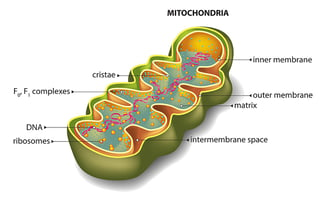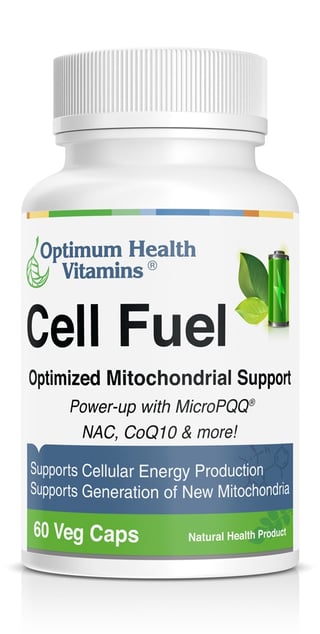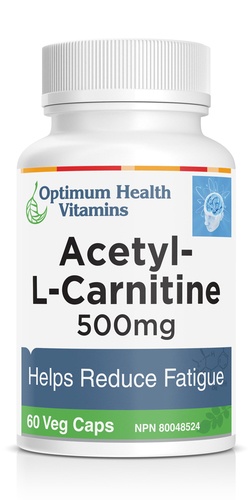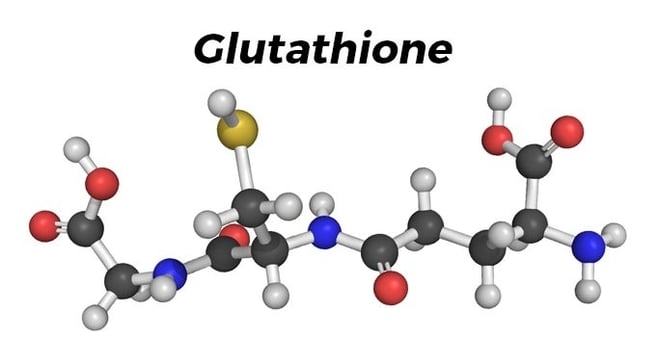
At Optimum Health we have been helping people deal with all types of fatigue naturally since 2002 by simply addressing the question of "how to combat chronic fatigue syndrome at the source"? The answer is by supporting your all-important mitochondria...the cellular "power plants" that generate your energy to begin with. This is the purpose of Optimum Health Vitamin's new formula called Cell Fuel®.
 Though most just associate the mitochondria with physical energy levels, few consider the essential roles they play in virtually every aspect of our health and function. After all, what does almost every process in the body require to be carried-out?...ENERGY!
Though most just associate the mitochondria with physical energy levels, few consider the essential roles they play in virtually every aspect of our health and function. After all, what does almost every process in the body require to be carried-out?...ENERGY!
Facilitating good mitochondrial function is a perfect example of where a "Target Approach" can be employed, and at the bullseye of that target, are the nutrients in Cell Fuel, which perform immediate and direct roles in the metabolic cycles that produce our energy.
For over 15 years now we have been recommending several of the ingredients in Cell Fuel for all manner of health challenges...namely Co-enzyme Q10, Acetyl-L-Carnitine, Alpha-Lipoic Acid, and N-Acetyl-Cysteine. Yet after the emergence of PQQ (pyrroloquinoline quinone), which not only supports mitochondrial function, but has been shown to increase the amount of mitochondria present in our cells...(a process known as "mitochondrial biogenesis" [1])...we have now put all of these ingredients together into one synergistic mitochondrial support formula.
 Cell Fuel® uses MicroPQQ™... for sustained blood levels
Cell Fuel® uses MicroPQQ™... for sustained blood levels
The form of PQQ in Cell Fuel® is a timed-released version called Micro-PQQ™. We used this form because, being highly water-soluble, regular BioPQQ™ clears the blood stream quickly. But Micro-PQQ™ absorbs more slowly, sustaining higher blood levels for up to 9 hours. [2] So it can exert its effects on energy levels throughout the day, rather than falling off after a few hours.
For more in-depth information on MicroPQQ™, see our recent article at:
What Are The Health Benefits Of PQQ (Pyrroloquinoline Quinone)?
Cell Fuel® uses the ubiquinol form of Coenzme Q10
Both forms of Co-enzyme Q10 you can buy, i.e. the newer ubiquinol and “regular” ubiquinone, play direct, integral roles in the mitochondria to produce cellular energy. Without them the mitochondria simply can not function!
You can think of CoQ-10 molecules as being the workers on an assembly line transferring critical energy components between each other. If our levels are low, (i.e. the line is short staffed), then production drops.
Cell Fuel uses the ubiquinol form Co-enzyme Q10 as it is both more directly antioxidant, and is especially much better absorbed when taken orally. [3,4]
Cell Fuel® includes Acetyl-L-Carnitine (ALCAR)
 L-Carnitine has been extensively studied for its health effects, and though we can produce it, in many situations our bodies may not produce enough, which has lead to it being labelled as conditionally essential. [5]
L-Carnitine has been extensively studied for its health effects, and though we can produce it, in many situations our bodies may not produce enough, which has lead to it being labelled as conditionally essential. [5]
L-Carnitine’s far-reaching benefits are partly due to its antioxidant properties, but especially to its central role in getting fat into the mitochondria for fuel. [6] Remember that fat is a rich source of energy, and L-Carnitine is necessary to enable transport of long-chain fatty acids across the inner-mitochondrial membrane to produce energy in the form of ATP. [6] (Said plainly, you need L-Carnitine to get fat into the "mitochondrial furnace", so you can burn it.)
This is largely through a process called beta-oxidation, which is critical for heart health. [6] Additional and extensive benefits of L-Carnitine have been documented for insulin resistance, metabolic syndrome, type II diabetes, hypertension, and kidney disease, [6, 7] .
 Yet, the acetylated form of L-Carnitine, i.e. Acetyl-L-Carnitine (ALCAR) confers additional benefits to the mitochondria. It boosts levels of a critical phospholipid called cardiolipin, which increases membrane integrity, thereby improving efficiency and energy production.[7] Further, it is able to cross the blood-brain barrier, where it increases production of several neurotransmitters. [8,9,10] Accordingly, ALCAR has shown to be particularly rejuvenating for preserving and enhancing brain and nervous system function...effects which are hard to separate from its mitochondrial benefits. [7,9,10]
Yet, the acetylated form of L-Carnitine, i.e. Acetyl-L-Carnitine (ALCAR) confers additional benefits to the mitochondria. It boosts levels of a critical phospholipid called cardiolipin, which increases membrane integrity, thereby improving efficiency and energy production.[7] Further, it is able to cross the blood-brain barrier, where it increases production of several neurotransmitters. [8,9,10] Accordingly, ALCAR has shown to be particularly rejuvenating for preserving and enhancing brain and nervous system function...effects which are hard to separate from its mitochondrial benefits. [7,9,10]
Like PQQ, ALCAR also participates in mitochondrial biogenesis, and has been shown to be anti-aging in general. [7,11] It has been widely studied for its applications to several neurological conditions, including Alzheimer's. [11] There was no doubt that ALCAR would be included in the Cell Fuel formulation.
ALCAR in Cell Fuel® works synergistically with Alpha-Lipoic Acid
Yet, while ALCAR increases mitochondrial output, alpha-lipoic acid works synergystically with it by mopping-up the extra free-radicals that are created in the process. [12]
As we have referred to in past articles, generating energy can be a heated process. Just like a leaky furnace, mitochondrial function can create a lot of "sparks" (free-radicals), and oxidation. Left unattended they can cause "fires" in the form of inflammation, which can hamper mitochondrial function, (as people who experience "exercise hangovers" can attest to.)
Alpha-Lipoic Acid not only neutralizes these excess free-radicals, maintaining mitochondrial efficiency and function, but it also helps attenuate oxidative stress by boosting production of the always critical antioxidant glutathione. [12,13] It also aids the the mitochondria by removing toxic by-products, including heavy metals [13]
NAC is added to Cell Fuel® as a direct precursor for producing more glutathione

As we have discussed many times before, volumes could be written about the critical importance of glutathione to your overall health. It is arguably your body's most important antioxidant, and, and one of its main functions in this regard is its role in preserving and supporting mitochondria function, and energy production.[14-16] N-Acetyl-Cysteine (NAC) is a direct glutathione precursor, which increases levels. [16] NAC is another substance that has shown promise in the treatment and prevention of Alzheimer's disease, and for preservation of our nervous system in general. [16,17] Once more, this is largely through supporting and maintaining mitochondrial function. [18]
So as you can see, it is very hard to separate energy levels, the brain, and nervous system function from the health of your mitochondria. The ingredients in Cell Fuel® have been combined to directly address these issues, and in general guard against energy failure.
In coming articles I will discuss another issue directly related to energy and mitochondrial function...that of adrenal function. (In fact, the adrenals are one of the most concentrated areas of mitochondria in the body, and if you assume Cell Fuel may be helpful, you would be right!)
Until then, continue to be well!
John

References
[1] https://www.ncbi.nlm.nih.gov/pmc/articles/PMC2804159/
[2] http://maypro.com/sites/default/files/studies/MicroPQQ%20Overview.pdf
[3 ] https://www.ncbi.nlm.nih.gov/books/NBK22505/#_A2512_
[4] https://en.wikipedia.org/wiki/Ubiquinol
[5] http://lpi.oregonstate.edu/mic/dietary-factors/L-carnitine
[6] https://www.ncbi.nlm.nih.gov/pmc/articles/PMC3590819/
[7] https://www.ncbi.nlm.nih.gov/pmc/articles/PMC4120470/
[8] https://www.ncbi.nlm.nih.gov/pubmed/14595704
[9] https://www.ncbi.nlm.nih.gov/pubmed/1839317
[10] https://www.ncbi.nlm.nih.gov/pubmed/22549035
[11] http://www.nature.com/mp/journal/v5/n6/full/4000805a.html
[12] https://www.ncbi.nlm.nih.gov/pmc/articles/PMC122286/
[13 ] https://www.ncbi.nlm.nih.gov/pmc/articles/PMC4566449/
[14] https://www.ncbi.nlm.nih.gov/pmc/articles/PMC4312826/
[15] https://www.ncbi.nlm.nih.gov/pmc/articles/PMC2129149/]
[16 ] http://www.sciencedirect.com/science/article/pii/S0925443911002262
[17] https://www.immunocal.com.my/wp-content/uploads/2014/01/immunocal-metabolism_and_functions_of_glutathione_in_brain.pdf
[18] http://www.scielo.br/scielo.php?script=sci_arttext&pid=S1516-44462011000400003

